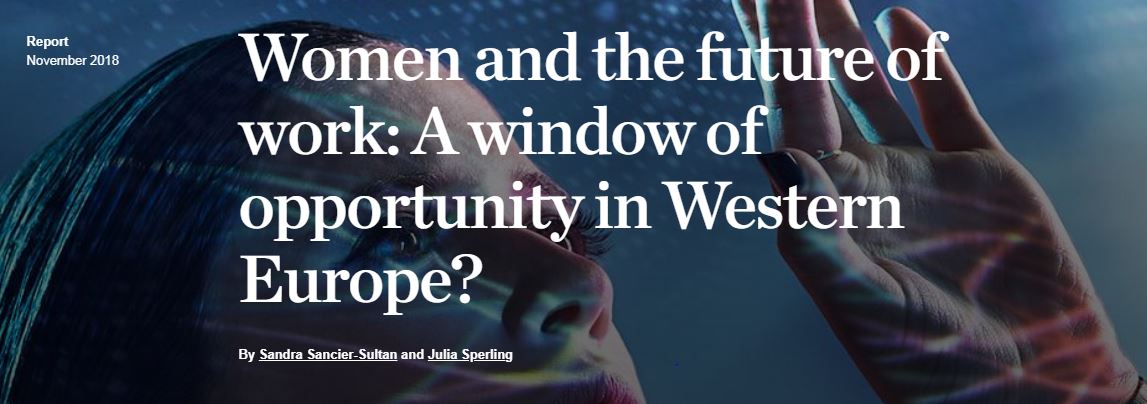What is in the Women Matter November 2018 ?
Western Europe has made progress towards gender equality over the past two decades, but significant gaps persist in workforce participation, leadership positions and pay. Major disruptions in the labor market have begun that could have profound implications for gender equality through 2030. Automation and artificial intelligence, for example, will displace many workers while, simultaneously, increasing investments, rising incomes or ageing population trends will create new jobs that require skills in short supply.
Few extracts :
To maximize women’s contributions in the labor force, workers, governments and public and private institutions need to act across 5 dimensions.
- Empowering through transparency on future opportunities
provide transparency – notably to women – on where pockets of growth will lie as some of them will emerge in different occupations and sectors from where women are present today. - Level skill-building playing fields for both women and men
Governments and business leaders will need to design large-scale “reskilling” programs to help women move into new roles or new content areas at any point in their careers. - Foster more dynamic career paths for women
Women will need to move more often across occupations, organizations and sectors. Companies will need to champion mobility for women within their ranks. - Create pathways to STEM fields of education by concerted efforts to encourage girls to study STEM topics and women to consider careers in STEM fields.
- Fix the leadership gap
Progress will require a comprehensive ecosystem that encompasses six dimensions for action:
CEO and management commitment;
Transparency and indicator tracking;
Programs for women’s leadership development including relevant sponsorship and mentorship support and de-biased training and coaching;
Diversity-enabling infrastructure including flexible working conditions, extended leave policies and back-to-work programs;
Inclusive mindsets and behaviors;
Involvement of men at all levels of organizations with a special focus on middle-management.
Co-authors
Sandra Sancier-Sultan Senior Partner of McKinsey, leader of Banking and Insurance practices. Co-author of the McKinsey Women Matter reports started in 2006. Sandra helps corporations accelerate on their gender diversity agenda and regularly addresses conferences and the media on this important topic. @ESSEC & MBA INSEAD.
Julia Sperling is a medical doctor, neuroscientist, and partner in McKinsey’s Frankfurt office. In 2017, she took over the Chefsache initiative, which aims to help women reach and thrive in leadership positions in Germany
sandra_sancier-sultan@mckinsey.com
julia_sperling-magro@mckinsey.com
© 2018 McKinsey & Company. All rights reserved. www.mckinsey.com @McKinsey
Download the full report :
Women-and-the-future-of-work-A-window-of-opportunity-in-Western-Europe
